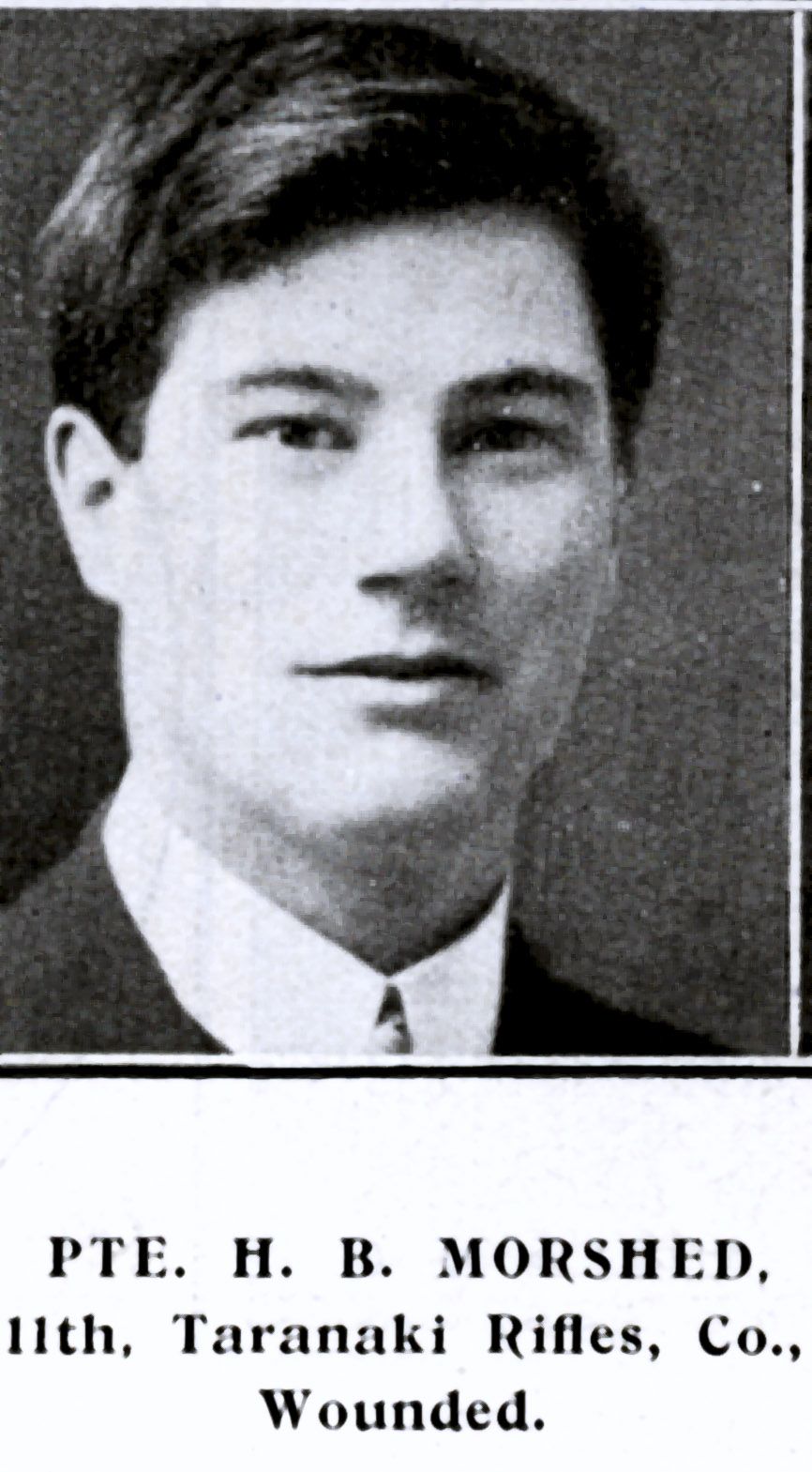It is with regret we have to record the death at New Plymouth Hospital today (Friday), of Mr Horace Morshead, a returned soldier, who left with the Main Body, saw active service at Gallipoli, and who returned to the Dominion over two years ago, invalided. He sufficiently recovered to be able to take up employment in the Hawera telephone Bureau, but after working there for several months, had a recurrence of his trouble, eventually having to go to the New Plymouth Hospital where he had been laid up for about twelve months. Deceased, who was 27 years of age, was well liked, and bore his suffering with great fortitude His mother and sister are residents of Hawera, and much sympathy will be felt for the family in their sad bereavement. Another son, Trooper A. Morshead, also gave his life for King and country, while a third, Corp. C. Morshead, has recently been wounded. -Hawera and Normanby Star, 6/12/1918.

Horace's army record shows that he volunteered for service at the beginning of the war and was admitted to the Hospital Ship Southland suffering a compound fracture of the arm on May 9th, 1915, at Gallipoli.
His unit was the Taranaki section of the Wellington Infantry Regiment and its Official History tells the story of a disastrous attack on Turkish trenches two days before his admission to the Hospital Ship:
The battalion was to move to the attack at 10.30 a.m., which left ten minutes for company commanders to arrange the advance of their platoons. The intention of the Divisional Commander was that the advance should commence from the front line trenches at 10.30 a.m., at which hour the bombardment of the Turkish position was to cease. Through lack of time and some misunderstanding, the Wellington and Auckland Battalions did not move from the reserve lines till 10.30 a.m. and, consequently had to cover the open ground between the reserve trenches and the front line and emerge from the front line wholly unsupported by artillery. The three attacking companies moved forward in successive lines of platoons with five paces interval between the men and fifty paces between the successive lines. As the moving lines were seen by the Turks salvoes of shrapnel were poured into them while the ground was whipped with machine-gun bullets which spat up dust viciously among the advancing lines. The attacking companies moved as if on parade. Intervals and dressing were kept perfectly. At times the dust and smoke from the bursting shrapnel would appear to have swept our men entirely PAGE 39away; but, when the air cleared, the lino could be seen moving steadily forward. The troops of the 29th Division cheered the advancing lines as they reached the front line trench and, without pausing, pushed steadily into the thickening hail of bullets. Taranaki Company early got into a vicious cross fire from Turkish machine-guns posted on the seaward side of the Gully Ravine. Its left flank was exposed by the slope of the ground, and, after making some progress, the line was forced to lie down to escape some of the fire, and the advance of the Taranaki Company came to a standstill. Hawke's Bay in the centre made steady progress against a heavy fire; but it kept in touch with Taranaki, and when its left flank bent back the right automatically came to a halt.
PERSONAL
Privates Norman Howell and Rea, of New Plymouth, who were invalided from England on the Ruahine, arrived by the mail train on Thursday night. They were met by the Mayor (Mr. C. H. Burgess), Mr. H. Okey, M.P., and Mr. C Carter (acting-chairman of the Patriotic Committee). Both men were well enough to proceed to their homes. Private Horace Morshead, of New Plymouth, left the train at Hawera, and will stay there some time with relatives. Private Terence Malone, second son of the late Colonel Malone, passed through New Plymouth this morning on his way to Stratford. He has made a good recovery from the shrapnel wounds, with the exception that he is deaf in one ear. Private F. Crann, another invalided soldier, returns to New Plymouth by to-night’s mail train. -Taranaki Herald, 7/1/1916.
Horace was in hospital for several months before he died. Without access to hospital records I can only imagine what his experience was like. Admitted with complications from a compound fracture, several months in hospital before dying - infection would be a possible cause of Horace Morshead's death.
 |
| New Plymouth Cemetery. |
No comments:
Post a Comment